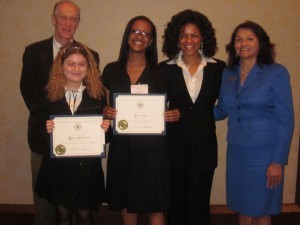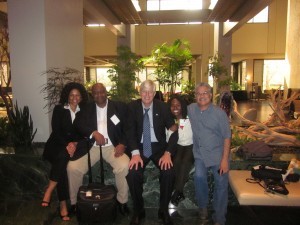I had a fabulous time this year attending the Texas State Historical Association 116th Annual Meeting in Houston, Texas. Organized in Austin in 1897, the Texas State Historical Association is the oldest learned society in the state. Its mission is to “foster the appreciation, understanding, and teaching of the rich and unique history of Texas and, by example and through programs and activities, encourage and promote research, preservation, and publication of historical material affecting the state of Texas.” As an American historian focusing on Texas history, I have been a member of TSHA since graduate school and have served on several TSHA committees over the years. TSHA is a good organization for historians focusing on Texas history to develop their skills as well as build some valuable relationships.
I began my graduate career at the University of Houston. This is my U of H family, from left to right: Me, Dwight Watson, Professor, Texas State University; Joseph Pratt, Professor University of Houston; Bernadette Pruitt, Professor, Sam Houston State University; Guadalupe San Miguel, Professor, University of Houston
This year I presented my research on a panel entitled “Beautiful People: The Range of Community Agency among African-Descent Texans, 1900-1980.” My presentation focused on African American and Mexican American efforts to desegregate the state of Texas during the early stages of the Civil Rights Movement. Dr. Bernadette Pruitt of Sam Houston State University also served as a panelists. Historians Karen Kossie-Chernyshev of Texas Southern University and Linda Reed of the University of Houston served as the panel’s moderator and commentator respectively.
My alma mater, The University of Texas at Austin Department of History, was represented well this year at the Fellows and Awards Luncheon. Cynthia Orozco, UT alum and historian, was honored as a TSHA Fellow.

Representing our institution well! University of Texas scholars from left to right: Alan Tully, Chair, Department of History; Allison Schottenstein, graduate student; Ava Purkiss, graduate student; Me; and Cynthia Orozco, UT alum and Professor, Eastern New Mexico University
UT graduate students Allison Schottenstein and Ava Purkiss received the John H. Jenkins Research Fellowship in Texas History and the Mary M. Hughes Research Fellowship awards respectively. The Chair of the History Department Alan Tully also attended the event. I was so happy to be able to celebrate with these UT honorees. Congratulations to each of you!
One of the conference highlights for me this year was listening to Darlene Clark Hine, Northwestern University Board of Trustees Professor of African American Studies and Professor of History, who delivered the meeting’s keynote address. As one of the premier and distinguished American historians of our time, Darlene Clark Hine presented a lecture entitled “Rights of Citizenship: Black Texans and the White Primary Cases.” Open to the public and held at Texas Southern University, Dr. Clark Hine recounted the historical development and significance of Smith vs. Allright and the important role that the African American community and leadership of Texas played in its success. According to Dr. Clark Hine, by defeating the all-white primary, African American Texans significantly impacted and propelled the advancement of the Civil Rights Movement.
Many conference participants were excited about attending the Presidential Banquet this year, honoring TSHA President Dr. Merline Pitre. Dean and Professor of History at Texas Southern University, Dr. Pitre is the first African American President of TSHA in its 116-year history. During her Presidential address Dr. Pitre presented a lecture entitled, “Texas and the Master Civil Rights Narrative: A Case Study of Black Females in Houston.” Further advancing Dr. Clark Hine’s keynote address, Dr. Pitre recounted the important role that African American Texans played in the development of the Civil Rights Movement, yet highlighted the role of African American women. According to Pitre, African American women influenced and shaped the direction and impact of the Movement. Emphasizing the minimal amount of research that has been produced on African American Texans and their contributions to the Civil Rights Movement, Dr. Pitre stressed the need for Texas historians to explore this topic. Only through including Texas can a full historical account of the Civil Rights Movement be told. According to Pitre, Texas is and should be a part of this story.
In addition to the keynotes, the TSHA meeting featured numerous sessions highlighting various topics and eras of Texas history. Texas historians from various parts of the country, but primarily from Texas, presented their research and participated in panel discussions. Although I always enjoy the sessions–some of which are extremely entertaining, my favorite part of the meeting every year is connecting with old friends who love Texas history and meeting new ones!










Post a comment